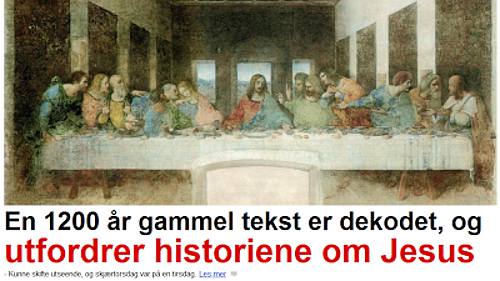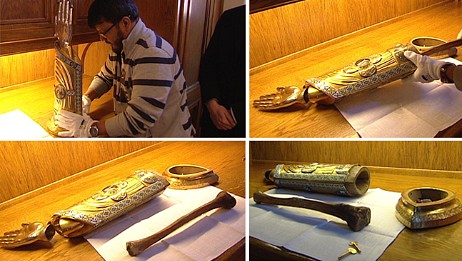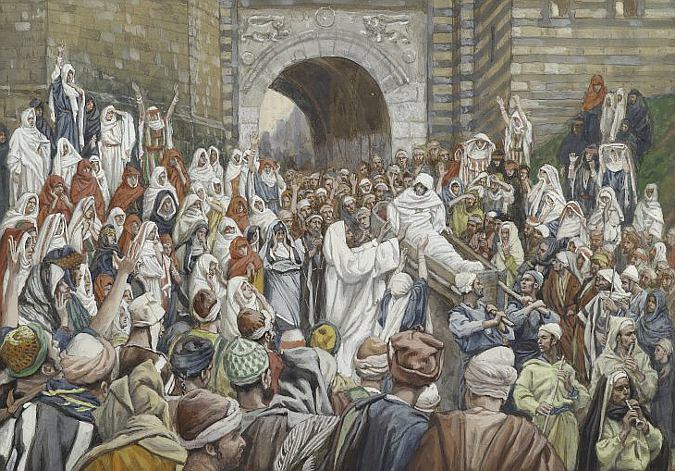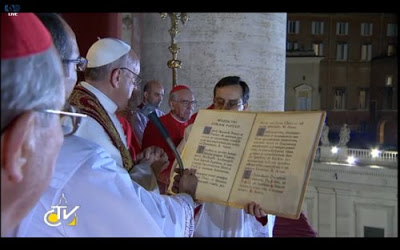Pasjonstid: evangelium onsdagen
I den tradisjonelle kalenderen er hele pasjonstida (fra søndag før palmesøndag) fokusert på motstanden mot Jesus og hans lidelse. Slik leste vi til messen og matutin onsdag etter pasjonssøndag:
Johannes 10:22-38
Nå kom den festen som ble feiret i Jerusalem til minne om tempelinnvielsen. Det var vinter. 23 Jesus gikk omkring i Salomos buegang på tempelplassen. 24 Jødene flokket seg om ham og spurte: «Hvor lenge vil du holde oss i uvisshet? Er du Messias, så si oss det rett ut!» 25 Jesus svarte: «Jeg har sagt dere det, men dere tror meg ikke. De gjerninger jeg gjør i min Fars navn, de vitner om meg. 26 Men dere tror meg ikke, for dere hører ikke til blant mine sauer. 27 Mine sauer hører min røst, jeg kjenner dem, og de følger meg. 28 Og jeg gir dem evig liv; de skal aldri i evighet gå tapt, og ingen skal rive dem ut av min hånd. 29 Min Far som har gitt meg dem, er større enn alle, og ingen kan rive noen ut av min Fars hånd. 30 Jeg og Faderen er ett.» 31 Da tok jødene igjen opp steiner for å steine ham. 32 Jesus sa til dem: «Mange gode gjerninger som er fra Faderen, har jeg vist dere. Hvilken av dem er det dere vil steine meg for?» 33 Jødene svarte: «For noen god gjerning steiner vi deg ikke, men for gudsbespottelse: Du som er et menneske, gjør deg til Gud.» 34 Jesus svarte: «Står det ikke skrevet i deres egen lov: Jeg har sagt: Dere er guder? 35 De som Guds ord kom til, blir altså i loven kalt guder, og Skriften kan ikke settes ut av kraft. 36 Hvorfor sier dere da til ham som Gud har helliget og sendt til verden: Du spotter Gud, fordi jeg sa: Jeg er Guds Sønn? 37 Hvis jeg ikke gjør min Fars gjerninger, så tro ikke på meg. 38 Men hvis jeg gjør dem, så tro i det minste gjerningene, om dere ikke tror meg. Da skal dere skjønne og innse at jeg er i Faderen og Faderen i meg.»Homily by St Augustin, Bishop of H ippo. – 42th Tract on John.
The Greek word Enkainia, used by the Evangelist, signifieth the Feast of the Dedication of the Temple. The derivation thereof is kainon, which is, being interpreted, new; and the Dedication of anything new is thence called Enkainia. The use of this word is still preserved among ourselves; if any man put on his new coat for the first time we say that he enkainiateth. It was the use of the Jews to keep solemn holiday upon the Anniversary of the Dedication of the Temple, and this was the Feast-day which was being observed when the Lord spake the words which have been read.It was winter. And Jesus walked in the Temple in Solomon’s Porch. Then came the Jews round about Him, and said unto Him How long dost Thou make us to doubt? If Thou be the Christ, tell us plainly. They sought not to know the truth, but to have whereof to accuse Him. It was winter, and they were cold; for they were slow to draw near to God’s fire. If to believe is to draw near thereto, then he which believeth draweth near thereto and he which denieth, goeth away therefrom. The feet of the soul, by which it moveth, are the affections thereof.
They were frozen with want of love, and at the same time on fire with thirst to do injury. They stood afar off, and yet came near; for though they drew not near by faith, they were eager to persecute. They sought to hear the Lord say I am the Christ; and perchance they knew somewhat concerning Christ, as touching His Manhood, for the Prophets had prophesied of Christ. But the Godhead of Christ even some heretics do not see witnessed either in the Prophets or in the Gospel; how much less the Jews, as long as the veil is upon their heart. 2 Cor. iii. 15.




